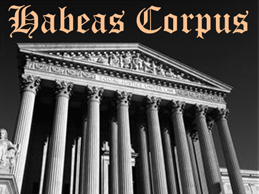Recognizing the Duty of a Post-Conviction Attorney in Seeking Justice After a Criminal Conviction
In the complex landscape of post-conviction legal process, the duty of a post-conviction attorney is essential in navigating the path to justice after a criminal sentence. Past the boundaries of a trial, these legal specialists participate in a diverse technique targeted at uncovering new proof, difficult legal mistakes, and promoting for their clients' rights. The intricacies of post-conviction job need a blend of lawful acumen, investigatory skills, and calculated believing to unravel the intricacies of a situation and pursue opportunities that may have been forgotten or underexplored. As the quest of justice extends past the confines of first procedures, the role of a post-conviction attorney becomes a sign of hope for those looking for to correct oppressions and reclaim their civil liberties within the legal system.
Post-Conviction Legal representative's Investigatory Work
Post-conviction legal representatives engage in precise investigatory job to uncover brand-new evidence, step-by-step mistakes, or misconduct that can potentially lead to rescinding a conviction. This investigatory phase is essential in the post-conviction procedure as it aims to recognize any type of overlooked information or legal bad moves that may have influenced the result of the first trial. Post-conviction lawyers dig right into situation documents, witness statements, and lawful paperwork with a fine-tooth comb, looking for any type of disparities or irregularities that could be grounds for charm.
Via complete investigation, post-conviction attorneys intend to shed light on possible injustices that may have taken place during the original test. They may carry out meetings, speak with professionals, and testimonial forensic evidence to develop an engaging instance for their clients. By inspecting every facet of the legal procedures, post-conviction lawyers function tirelessly to discover any kind of factors that may have affected the judgment. Ultimately, their investigative job plays a pivotal function in the quest of justice and the possible reversal of wrongful convictions.
Crafting Appeals and Petitions
In the quest of justice after a conviction, skilled lawyers thoroughly craft charms and requests to existing engaging disagreements for the reconsideration of lawful choices. Crafting charms and requests needs a deep understanding of the legal system, attention to detail, and tactical thinking. Post-conviction lawyers analyze trial records, recognize possible mistakes or offenses of civil liberties, and develop legal arguments to challenge the conviction or sentence.
When crafting an appeal, attorneys concentrate on highlighting legal mistakes that might have affected the outcome of the situation. They investigate situation law, laws, and lawful criteria to sustain their disagreements. Requests, on the other hand, might involve providing brand-new proof that was not available during the test or demonstrating changes in the regulation that necessitate an evaluation of the conviction.
In addition, post-conviction legal representatives need to stick to rigorous procedural rules and target dates when filing find out here now appeals and applications. They should present their disagreements clearly and persuasively to encourage the court to give alleviation to their customers. Through careful crafting of appeals and applications, post-conviction attorneys strive to protect justice for individuals that have been wrongfully founded guilty or unfairly punished.

Going After Post-Conviction Alleviation
Post-conviction relief encompasses an array of legal mechanisms made to test the credibility of a conviction or sentence. Post-conviction attorneys play an important role in browsing these complex treatments, making sure that all legal choices are explored to fix injustices that might have happened throughout the trial or sentencing stage.
One typical form of post-conviction relief is submitting a request for post-conviction relief, typically based upon insurance claims of ineffective aid of guidance, prosecutorial transgression, recently discovered proof, or constitutional offenses. These petitions call for a detailed evaluation of the test document, lawful research study, and persuasive advocacy to encourage the court to approve alleviation. Experienced post-conviction lawyers have the skills and expertise needed to recognize practical lawful insurance claims, carry out examinations, and present compelling debates to protect alleviation for their clients. By vigilantly seeking post-conviction alleviation, these attorneys aim to fix losing the unborn babies of justice and promote the concepts of justness and due process in the criminal justice system (Lawyer).
Utilizing Forensic Evidence
When challenging a conviction or sentence, the tactical usage of forensic evidence can be a powerful device in post-conviction lawful procedures. Forensic evidence includes a broad range of scientific techniques made use of to examine criminal offenses and develop facts in court. Post-conviction lawyers can leverage forensic proof to test the credibility of convictions by presenting brand-new clinical findings that were not available throughout the initial trial.

Participating In Sentence Alterations
Post-conviction lawyers might explore the possibility of sentence modifications as a legal avenue to address disproportionate or unjust sentences bied far in criminal situations. Sentence adjustments involve seeking changes to the terms of an offender's sentence after a sentence has actually taken location. These adjustments can include decreasing the length of a sentence, altering the kind of penalty enforced, or exploring alternative sentencing alternatives.
Post-conviction legal representatives can go after sentence adjustments through numerous lawful mechanisms, such as submitting activities for sentence reduction, appealing for compassionate launch, or discussing plea bargains for minimized sentences. They should carefully review the conditions of the situation, assess the lawful grounds for seeking an alteration, and present engaging disagreements to the court supporting the demand for a revised sentence.
Engaging in sentence adjustments requires a comprehensive understanding of criminal regulation, sentencing standards, and the particular treatments associated with looking for post-conviction relief. Post-conviction legal representatives play a vital role in promoting for fair and simply outcomes by difficult sentences that are unduly rough or do not line up with the concepts of justice.
Verdict
Finally, the duty of a post-conviction lawyer is important in looking for justice after a criminal conviction. With investigatory work, crafting allures and petitions, going after post-conviction alleviation, utilizing forensic proof, and participating in sentence modifications, these attorneys play an important function in supporting for their clients and making sure that their civil liberties are upheld within the criminal justice system. Their commitment and knowledge are crucial in navigating the complexities of post-conviction procedures and attaining a reasonable outcome for individuals dealing with criminal sentences.
Comments on “Lawyer's Function in Filing a Habeas Corpus Request Explained”